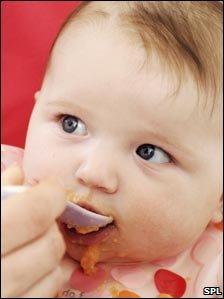Q&A: Is early weaning best for breastfed babies?
- Published

Babies often put things in their mouths when ready for solids
Babies who have been breastfed could benefit from being weaned onto solid food before they are six-months-old, researchers writing in the have said, contradicting official advice.
What does the paper say?
Experts, from three child health institutes in London, Birmingham and Edinburgh, looked at the scientific research on feeding babies.
They say there is evidence from the US and Sweden which suggests babies not weaned until six months could be at an increased risk of developing food allergies and iron deficiencies.
It also quotes , which suggests some - but not all -babies - can benefit from being weaned between four and six months.
They say it makes sense to stick to the six-month advice in developing countries, where access to clean water and safe weaning foods is problematic and could increase the risk of infections, but that the UK - as a developed country without those problems - should reconsider its stance.
Where does the existing advice come from?
The World Health Organization issued the six month rule in 2001.
It based its findings on research which said breastfeeding reduced babies' risk of developing infections.
However, that research did suggest there was a potential risk that babies may develop iron deficiency anaemia if only given breastmilk.
Has the WHO changed its view?
No.
It still recommends exclusive breastfeeding for the first six months.
What's happening in the UK?
The Department of Health has said it is not deviating from the WHO advice.
But it had already asked an expert body to review the whole area of infant nutrition and that group will report later this year.
The BMJ paper will be considered as part of that.
The National Childbirth Trust, Royal College of Midwives and the Royal College of Paediatrics and Child Health support the six month advice.
It is confusing. What should parents do?
The official advice remains that babies should be weaned at six months.
says: "Around six months your baby needs more than milk alone and is able to eat solid foods in addition to breast or formula milk."
The signs parents are advised to look out for are: is their baby able to sit up, does he or she want to chew and put toys and other objects into his/her mouth and is he/she reaching and grabbing accurately.
- Published14 January 2011
- Published17 December 2010
- Published28 September 2010